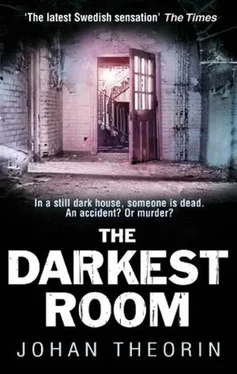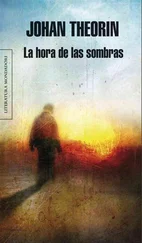with the island, but just as when she traveled to Paris, she longs for an artistic environment. And of course Öland is famous for its light and for the artists who have succeeded in capturing it. My mother babbles about Nils Kreuger, Gottfrid Kallstenius, and Per Ekström.
I am just happy to be leaving the city where that old doctor lives.
We arrive in Borgholm on the ferry. We have all our possessions with us in three suitcases, plus Torun’s package of canvases and oils. Borgholm is a neat little town, but my mother is unhappy there. She thinks the people are stiff and haughty. Besides, it’s much cheaper to live out in the country, so after a year or so we move again, to a red outbuilding in the village of Rörby. We have to sleep under three blankets, because it is always so cold and drafty.
I start at the local school. All the children there think I speak a kind of affected big-city talk. I don’t say what I think of their dialect, but I still don’t make any friends.
Soon after we end up out in the country, I start to draw in earnest; I draw white figures with red mouths and Torun thinks they’re angels, but it is the doctor and his slashed mouth that I am drawing.
When I was born, Hitler was the big bad wolf, but I grow up filled with the fear of Stalin and the Soviet Union. If the Russians want to, they can conquer Sweden in four hours with their airplanes, according to my mother. First they will occupy Gotland and Öland, then they will take the rest of the country.
But for me, as a child, four hours is quite a long time, and I give a great deal of thought to what I would do during this last period of freedom. If the news comes that the Soviet planes are on their way, I will run off to the store in Rörby and stuff myself with as much chocolate as I can, I’ll eat all they’ve got, then I’ll grab some crayons and paper and watercolors and rush back home. Then I’ll be able to cope with
living the rest of my life as a communist, just as long as I can carry on painting.
We move around as lodgers from one place to another, and every room we rent stinks of oils and turpentine. Torun makes enough money to live on by cleaning, but paints in her spare time-she goes out with her easel and paints and paints.
In the last fall of the 1950s we move again, to an even cheaper room. It is in an old building at the manor house at Eel Point. An outbuilding, built of limestone, with whitewashed walls. Cool and pleasant to live in during the hot summer days, but freezing cold the rest of the year.
When I find out that we are going to live near lighthouses, of course I get a whole lot of magical pictures in my head. Dark, stormy nights, ships in trouble out at sea, and heroic lighthouse keepers.
Torun and I move in one October day, and I immediately feel unwelcome there. Eel Point is a cold and windy place. Walking between the big wooden buildings feels like sneaking around some desolate castle courtyard.
The pictures in my imagination turn out to be entirely false. The lighthouse keepers have left Eel Point, and only come to visit a few times a year-the lighthouses were converted to electricity a year or so after the war, and ten years later everything was automated. There’s an old watchman; his name is Ragnar Davidsson and he lumbers around at Eel Point as if he owned the place.
A couple of months after we move in, I experience my first blizzard-and almost end up an orphan at the same time. It is the middle of December, and when I get home from school, Torun isn’t there. One of her easels and the bag with her oils in it is also missing. Twilight falls and it begins to snow; the wind from the sea grows stronger.
Torun doesn’t come back. At first I am angry with her, then I start to feel afraid. I have never seen so much snow whirling past the windows. The flakes are not falling, they are slicing through the air. The wind shakes the windowpanes.
Half an hour or so after the storm begins, a small figure finally appears, plowing through the snowdrifts in the inner courtyard.
I hurry outside, grab hold of Torun before she collapses, and help her inside, to the fire.
The bag is still hanging over her shoulder, but the easel has been swept away in the storm. Her eyes are swollen shut; grains of ice mixed with sand have blown into them, and she can hardly see. When I take off her clothes, they are soaked; she is frozen stiff.
She had been sitting painting on the far side of the peat bog, Offermossen, when the clouds gathered and the storm came. She tried to take a shortcut through the tussocks of grass and the thin ice of the bog, but fell into the water and had to fight her way onto firmer ground. She whispers:
“The dead came up out of the bog… lots of them, clawing at me, ripping and tearing… they were cold, so cold. They wanted my warmth.”
Torun is rambling. I get her to drink some hot tea and put her to bed.
She sleeps peacefully for more than twelve hours, and I keep watch by the window as the snowfall gradually diminishes during the night.
When Torun wakes up, she is still talking about the dead who walked in the blizzard.
Her eyes are scratched and bloodshot, but the very next evening she sits down at a canvas and begins to paint.
Just when Tilda had stopped thinking about Martin Ahlquist every morning and night, the telephone rang in her little kitchen. She thought it was Gerlof, and picked up the receiver without any misgivings.
It was Martin.
“I just wanted to see how you were. Make sure everything’s okay.”
Tilda didn’t speak; the pains in her stomach came back immediately. She gazed out at the empty quays in the harbor.
“Fine,” she said eventually.
“Fine, or just okay?”
“Fine.”
“Do you fancy having a visitor?” asked Martin.
“No.”
“Isn’t it lonely in northern Öland anymore?”
“Yes, but I’m keeping busy.”
“Good.”
The conversation was not unpleasant, but it was short. Martin ended by asking if he could ring her again, and she said yes in a very small voice.
The wound somewhere between her heart and her stomach started bleeding again.
It isn’t Martin who’s ringing, she thought, it’s his hormones. He’s just horny and wants a change from his wife again; he can’t cope with everyday life…
The worst of it was that she still wanted him to come over, preferably that very night. It was sick.
She should have mailed the letter to his wife long ago, but she was still carrying it around in her purse like a brick.
Tilda worked long hours. She worked almost all the time to avoid thinking about Martin.
In the evenings she would sit for hours preparing the talks on traffic awareness or law and order that she was due to give in schools or to local companies. And as often as she could, in between the talks, the foot patrols, and the paperwork, she went out in her police car all over the area.
One Tuesday afternoon, on the deserted coast road, she slowed down when she saw the twin lighthouses at Eel Point. But she didn’t stop; instead she turned down toward the neighboring property where a farming family lived. Their name was Carlsson, she recalled. Her only visit there had been on that long, difficult night after Katrine Westin had drowned, when Joakim had broken down in the neighbors’ hallway.
The lady of the house, Maria Carlsson, recognized her at once when she rang the doorbell.
“No, we haven’t seen much of Joakim this fall,” she said when they were sitting at the kitchen table. “We haven’t fallen out, nothing like that, but he tends to keep himself to himself. His children play with our Andreas sometimes.”
“And what about his wife, Katrine?” said Tilda. “Did you
Читать дальше










